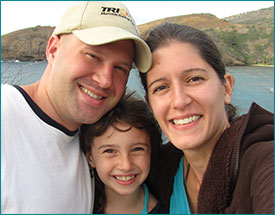 Home
Home- About H&V
- Resources
- Services
- Chapters
My daughter, Julia, was diagnosed with moderate, bilateral, sensorineural hearing loss just before she turned three. She was fitted with hearing aids, dubbed her “magic ears” by her audiologist, and conquered a significant speech and language delay by her fourth birthday. For me, that first year after her diagnosis was a blur of emotions and appointments.
 The Resciniti family
The Resciniti familyIn those early days, I sometimes used the term "hearing impaired" to describe my daughter. I was quickly notified by a deaf adult that no one wants to be "impaired." It has a negative connotation. She wasn’t offended but wanted me to consider altering my vocabulary to avoid potentially upsetting someone in the future. I then deliberately adopted "hard of hearing" and "hearing loss" as the descriptors around our house. Julia herself, now almost eight-years-old with a moderate to severe hearing loss, would say that has a hard time hearing without her hearing aids. She might also draw a picture of a cochlea and explain the function of hair cells. The girl knows a lot about ears.
Some families raising a child with a similar hearing loss use the word "deaf." I never put much thought into the semantics of it all until we took a family trip to Niagara Falls. Our hotel room was on the 49th floor. The view was incredible and worthwhile even with a ridiculously long elevator ride to the ground floor swimming pool. After an evening swim, Julia was dripping wet and without her hearing aids in the elevator. We know a few signs and Julia can hear loud speech at close range. We get along pretty well at the pool and while waiting to dry off without the aids. A middle aged man got in the elevator and began to make friendly small talk with Julia. It was obvious that she'd just been swimming. He was trying to ask her if she liked the water slide. She did not respond. "She's deaf," my husband Tim explained to the man. I nearly gasped. Immediately, I felt like screaming, "She is not. She is hard of hearing." The man continued talking. Tim leaned over to repeat the questions so Julia could answer and the conversation kept going. I stood back, feeling strange about the bizarre knee-jerk reaction I'd just experienced. Later, when I revealed to Tim my innermost ravings on the topic, he said "It was just easier to say “deaf.'" I agreed, all the while aware that had I answered first, I would have given the man an educational presentation occupying the entire length of the elevator ride. (Quick picture of a cochlea, anyone?)
Now, removed from the immediacy of providing an unplanned explanation, I wonder if it even matters how I feel about these words. Julia will tell the world what she is. She’s maturing every day and it is up to her to decide if she’s deaf, hard of hearing, has a hearing loss or even a hearing impairment. She might choose all or none of the above.
And the beauty of it is: whatever she picks no one can tell her that she’s wrong.